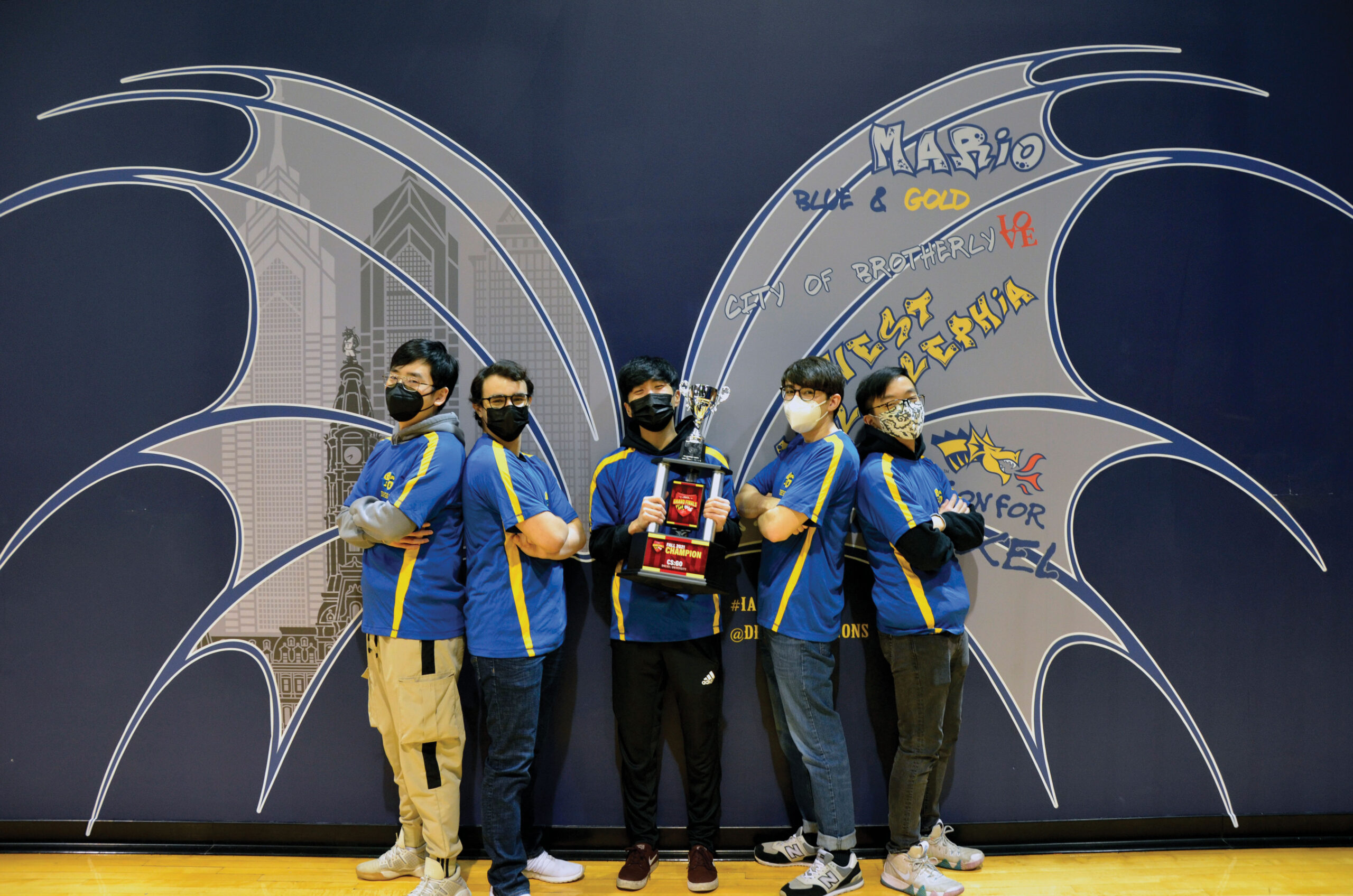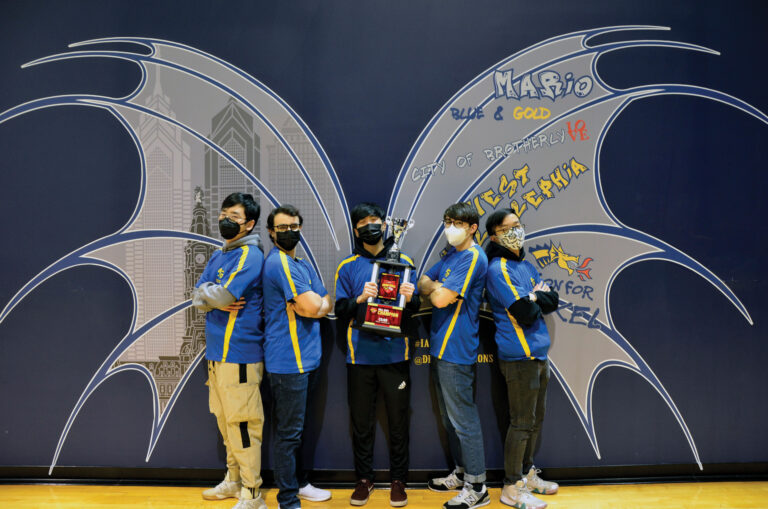
The CS:GO team is Junjie Lin, Noah Vaknin, Jacob Lee, David Stone, James Tran, and William Trampel (not pictured). Credit: Beth Ann Downey.
There’s a team of Drexel student-athletes who, in December, defeated a team that outmatched them in resources, coaching support and practice time. They rebounded after losing the first match of a grand finale to beat their rivals from Davenport University two out of three in what was considered a David-and-Goliath-esque underdog victory. In December, they won a $5,000 prize and a first-place trophy.
Then in April, they did it again, going undefeated the entire season to become back-to-back two-time national champions.
They’re the Drexel CS:GO team and their sport of choice is Counter Strike: Global Offensive, a first-person shooter video game. They’re one of seven club sports that play video games competitively through Drexel Esports. And their wins against 100 teams in the National Association of Collegiate Esports (NACE) Starleague fall 2021 season, and again in the spring season, were huge accomplishments within a burgeoning collegiate sport.
“This was a big accomplishment, a school coming from basically nothing to winning and becoming the best school in the country at this game,” says Noah Vaknin, a third-year software engineering student on the winning CS:GO team. “Maybe it will never reach the sense of pride and accomplishment that [other sports teams] feel, but we’ve done something that I don’t think 99 percent of the other teams at our school have done.”
Like other athletes, Vaknin has been honing his craft in CS:GO for years, since his early teens. He is approaching 10,000 hours of play in his lifetime, supported by a four-hours-a-day, seven-days-a-week practice schedule. He dreams of someday soon going pro and making a living playing CS:GO.
“My parents weren’t always the most supportive, but they’ve definitely grown on the idea,” Vaknin says. “My grandma watches every single game that I play, which is really cool. It’s been a really long road to get to where I am. We’re not cracking into the pro scene quite yet, but we are definitely all getting there.”
Counter Strike: Global Offensive is a team-based, first-person shooter game with an objective of eliminating opposing players while planting/defending or defusing bombs. Each round, or map, unfolds in a new environment with unique advantages and strategic challenges.
Every map goes to best of 30, so the first team to 16 wins. A 15-15 draw warrants overtime.
“[My grandma] describes it is as a game of chess,” Vaknin says. “You have to maneuver around the opponent. You have to understand why they’re doing things that they’re doing. And then there’s … the strategic element, which is that your body has to keep up with your brain. You have to be able to react.”
“We literally won North America. How many other teams do that?” – ALEXIS MALAMAS
“The thing I really like about this game is…there’s a lot of personality to each player, and there’s a lot of coordination, teamwork and also individual talent that goes into the game more than other esports I’ve seen,” adds David Stone, a fourth-year computer science
major and the team captain.
Matt Moran, club sports coordinator for Recreational Athletics, hopes the CS:GO victory is just the beginning for Drexel esports.
“It’s honestly astounding how fast esports have grown,” Moran says. “I think it’s the next up-and coming thing. There’s a lot of money involved in it. It’s a big, growing organization, so for Drexel to be involved in that even at the club sport level is a huge advantage. You’re seeing more and more universities get into it.”
Drexel is positioned to ride the esports wave. It has a large gaming community already and gaming-related research partnerships with Comcast Corp., which is completing a new esports stadium in South Philadelphia.
On the academic side, LeBow’s Department of Sport Business recently launched an esport business degree program in collaboration with the Antoinette Westphal College of Media Arts & Design.
“My dream is to get us moved to Athletics and also to have an esports facility on campus,” says Alexis Malamas, a biomedical engineering student and president of the Drexel Esports Club, which has a social sister organization called Drexel Gaming Association.
“Club sports is definitely the start of it, but us becoming the best university in North America for CS:GO is our golden ticket to that,” says Malamas.
“We literally won North America. How many other teams do that?” Drexel esports teams have been accepted into the NACE varsity program, and they have gained access to top-tier facilities operated by Nerd Street Gamers, a gaming venue in Philadelphia. Malamas says she is also working on creating Drexel’s own esports league to host their own tournaments with other universities of their choosing.
“More growth would really help us pass this down in the next couple of years when we graduate,” says Will Trampel, a fourth-year information systems student on the CS:GO team. “That way, we can keep this going. We don’t want this to die. This is something we’ve invested so much time into and we really care about.”
In the meantime, they’re just looking forward to the next match, the next laugh, and maybe to find a spot in the Rec Center for that trophy.
“Every time we walk past [it] we’ll be like, ‘Yeah, that trophy? We won that playing video games,’” Stone says.




